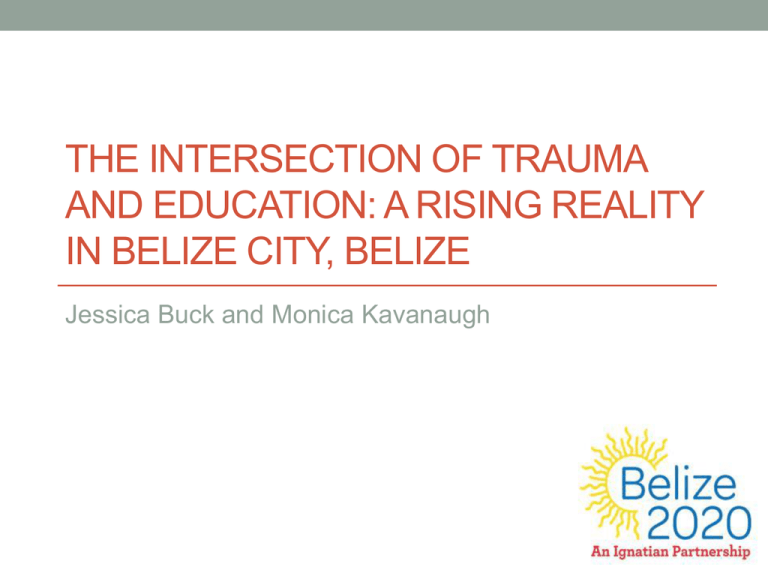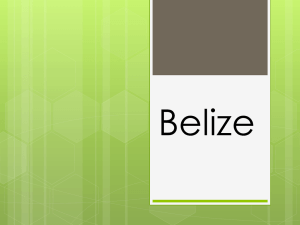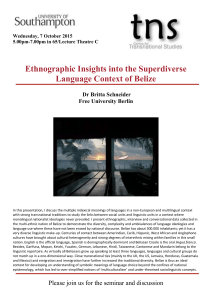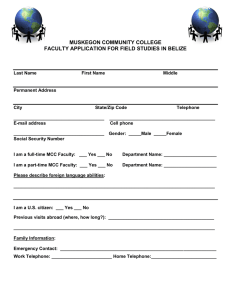
THE INTERSECTION OF TRAUMA
AND EDUCATION: A RISING REALITY
IN BELIZE CITY, BELIZE
Jessica Buck and Monica Kavanaugh
BELIZE 2020 PARTNERS
BELIZE 2020 MISSION
Belize 2020 is a non-profit volunteer
organization focused on improving the
quality of life in Belize by supporting Jesuit
ministries in that country that nurture
spiritual, physical, academic and
economic health.
THE COUNTRY OF BELIZE
• Population: 347,000
• 56% of population <24 yrs.
• Tourism is primary
economic driver
• Major transit route for
drug trade
• Belize has the third
highest homicide rate in
the world
• 95% of all murders in
Belize City are gangrelated
Post Traumatic Stress Disorder (PTSD)
PTSD is a
mental health
condition that is
triggered by
experiencing,
witnessing or
learning of a
terrifying event.
Criterion A: Presence of a
traumatic event
Criterion B: Re-experiencing of
the event
Criterion C: Avoidance
Criterion D: Increased Arousal
PTSD IN DEVELOPING COUNTRIES
• Little research on
trauma in developing
countries
• Most research focuses
on…
• Adult experiences
• Post conflict settings
• Need:
• Child experiences
• Evidence base
PTSD AND EDUCATION
1. Disruptive Behavior
2. Decreased ability to calm down in the
classroom
3. Delayed language ability
4. Decreased attention span
5. Absence from school due to illness
6. Motor skills/ balance
7. Memory
ST. MARTIN DE PORRES
• Students: 700+, grades PreK-8th
• Staff: 30+ teachers and administrators
• Location: South Belize City
• Serves the surrounding neighborhood
ST. MARTIN DE PORRES
Study Objective: To identify the type and frequency of trauma
experienced by students at St. Martin de Porres by screening for
Post Traumatic Stress Disorder (PTSD).
METHODS
• UCLA PTSD Index
• Culturally adapted to
the Belizean context
• Child and Adolescent
METHODS
• Standard 3-Standard 6
• Ages: 9-16yrs
• One-on-one interviews
• Six Administrators
• 3-4 weeks
PTSD WORKSHEET SCORING
1. Full PTSD Likely
2. Partial PTSD
Likely
3. NO PTSD
WHAT WE WERE LOOKING FOR
1. Type and description of MTE
2. Role played in MTE
3. Timing of MTE
4. How many students met each criterion
5. How many students fell into each
diagnostic category
6. Number of students experiencing each
trauma type
TRAUMA CATEGORIES
Natural
Disaster
Serious
Accident
Gang
Violence
Domestic
Violence
Physical
Abuse
Sexual
Abuse
Community
Violence
School
Violence
Bereavement
Dead
Body
RESULTS
Diagnosis Results
• 281 students surveyed
• 137 females
• 144 males
• 251 resided in city
No Diagnosis
Full Diagnosis
Partial Diagnosis
20%
• 75.8% met Criteria A
• 56.7% met Criteria B
• 28.1% met Criteria C
• 46.6% met Criteria D
54%
26%
RESULTS
Most Traumatic Event: Type
School Violence
1
Natural Disaster
4
Sexual Abuse
6
Physical Abuse
7
Serious Accident
11
Dead Body
14
Other
21
Domestic Violence
21
Community Violence
31
Bereavement
46
Gang Violence
57
No Traumatic Experience…
0
62
10
20
30
40
50
60
70
RESULTS
Traumatic Event Exposure Frequency
Dead Body
89
Bereavement
122
School Violence
43
Community Violence
148
Sexual Abuse
14
Physical Abuse
98
Domestic Violence
106
Gang Violence
165
Serious Accident
42
Natural Disaster
53
0
50
100
150
200
RESULTS
“I’ve seen 10-12 dead
bodies around my
house. Sometimes I
see it happen.
Sometimes I go check
and make sure it’s not
my dad” –Male, 13
“I was waiting for my
auntie on the street. I
saw a man with a gun
right in front of me shoot
up another man. He
dropped. He was on the
phone. I saw his blood” –
Female, 12
When asked if she
was afraid that a
gang shooting would
happen again, a
female student
responded,
“Everyday”.
“Pa gets drunk and
beats ma. He hits
her all over but
mostly in the face
and does not
apologize. I tried to
stop it once and I
got hit.” –Male, 11
“I was lying in my uncle’s
house. My uncle screamed
and someone started
shooting at the house.
Bullets came through the
windows, one bullet hit my
cousin in the leg” –Male, 11
WHAT IS NEXT FOR ST.MARTINS?
What is currently being done…
1. Teacher assessments
2. Teacher outreach and
education
3. Extended Day Program
4. Classroom de-escalating
techniques
TEACHER ASSESSMENTS
• PTSD Assessment, Follow-up Counseling and Group
Therapy Sessions
• Saw reductions in severity scores
• 10 requested longer sessions
• Very positive feedback
“A Revelation. Would do this over again and again.”
“Thank you all, this was a life changing experience”
“This workshop have helped me to better care for myself and by doing
so I will be able to better care for my students!”
WHAT IS NEXT FOR BELIZE?
What is currently being done…
1. Further research in other
areas of Belize
2. Discussion with Belizean
Department of Health
and Ministry of
Education
3. National traumainformed response
When asked if he
expected to live a long
life, a 15 year-old male
replied, “Only if I move
out of Belize City”.
GLOBAL IMPLICATIONS
• More research needs to
be conducted globally on
the issue of trauma
• Shift from individual-level
understanding to population
understanding
• Developing countries
• Trauma informed practice
• Stigma
QUESTIONS?
Continue the conversation at:
“Treating Trauma: The Reality for Global and Local Refugees” on
Tuesday at 12:45PM in BSC 253D
“Bridging Realities: An Interdisciplinary Immersion in Belize” on
Thursday, April 7 at 4:00pm in BSC 253D



